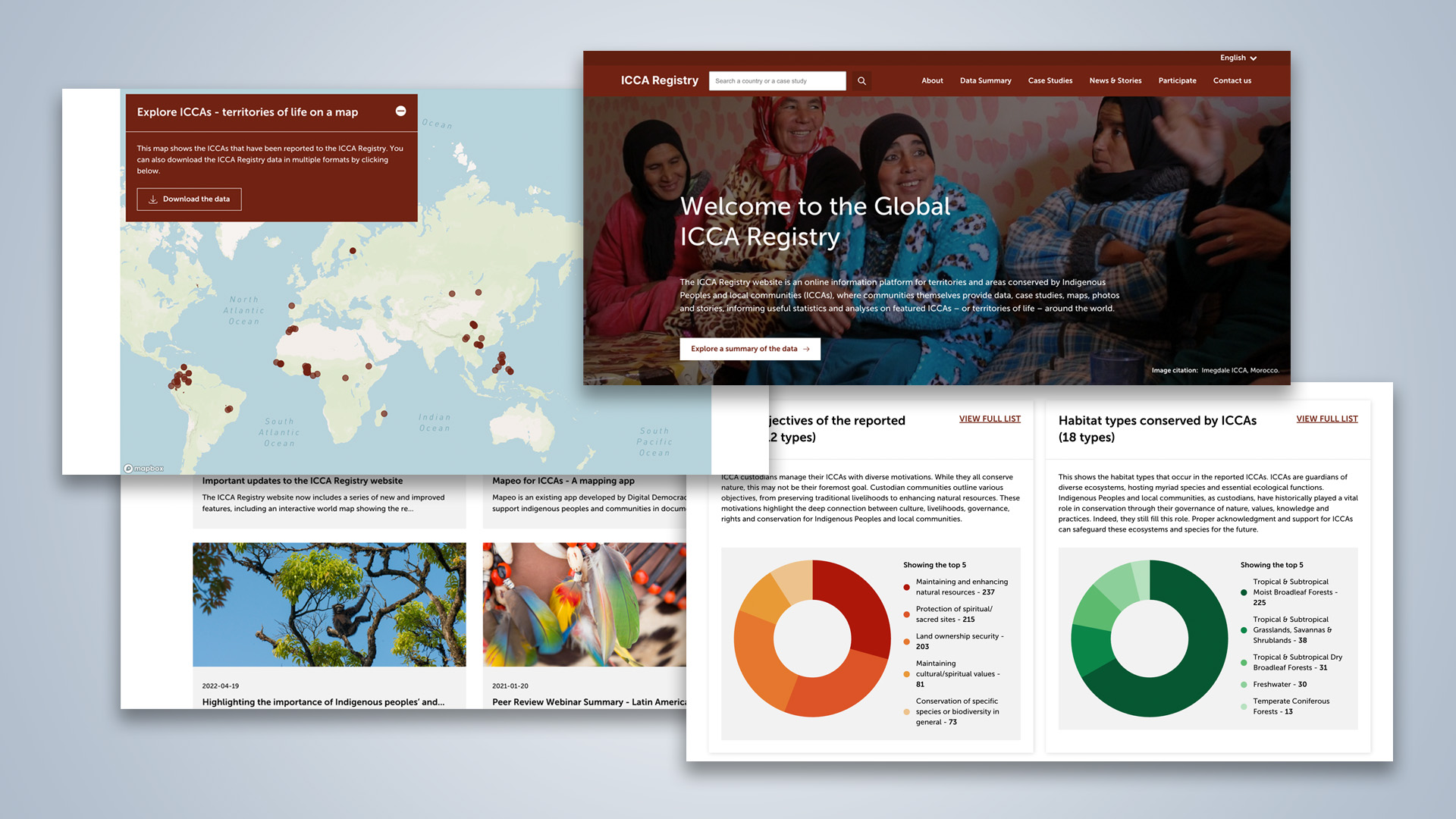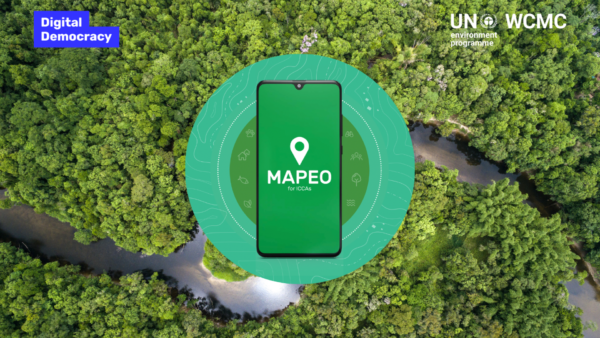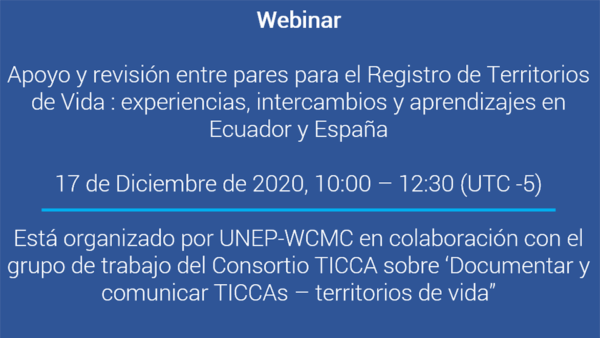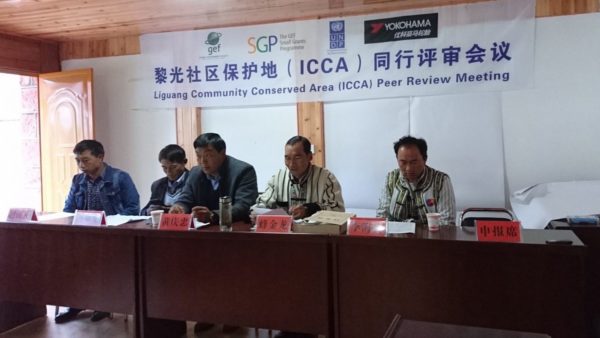The public launch of the ICCA Registry—a global database on conservation by Indigenous Peoples and local communities, marks a significant milestone in accessibility to such crucial information, underlining its international significance
First published on 04/25/2024
By Jasmin Upton, Programme Officer and Sol Fernandez-Rodriguez, Associate Programme Officer, at the UN Environment Programme’s World Conservation Monitoring Centre (UNEP-WCMC)
Information on hundreds of ICCAs— territories of life[1] —is now publicly available on the ICCA Registry website, www.iccaregistry.org. This global database showcases these territories and their critical contribution to conserving biocultural diversity.
The ICCA Registry, developed in 2008 through a close collaboration between the ICCA Consortium, UNEP-WCMC, and other partners, is also a reporting platform that strengthens the evidence on the conservation importance of ICCAs—territories of life. It enhances global understanding and recognition of these crucial areas and the conservation practices of their custodians.
ICCAs—territories of life are “territories and areas governed, managed, and conserved by custodian indigenous peoples and local communities.”
The ICCA Consortium’s toolbox explains that ICCAs—territories of life refers to “an age-old, widespread, diverse and dynamic phenomenon that has many different manifestations and names worldwide. Examples include: wilayah adat, kaw, himas, agdals, tagal, yerli qorukh, faritra ifampivelomana, oran, ili, asang, rumak, qoroq, qoroq-e bumi, sapari, baldíos, crofts, regole, aschii… In diverse political contexts, they may be referred to as ‘commons’ and ‘greens,’ ancestral domains, ‘country,’ community conserved areas, territorios autonomos comunitarios, comunales, territorios de vida, territorios del buen vivir, sacred natural sites, locally managed marine areas and fishing grounds, and many more.”
Indigenous peoples and local communities play an unparalleled and outsized pivotal role in the governance, conservation, and sustainable use of the world’s biodiversity and nature. Territories of life, predominantly managed by these communities, are estimated to encompass more than 20 percent of the world’s land and more than 20% of the extent of the world’s terrestrial Key Biodiversity Areas (Territories of Life: 2021 Report).
Definitive data on territories of life, including the existing number, has been a longstanding gap. However, the ICCA Registry, in collaboration with the ICCA Consortium, UNEP-WCMC, and partners, is actively working to fill this gap.

Indigenous peoples and local communities meticulously self-report data on territories of life to the ICCA Registry. This process involves a rigorous verification procedure based on peer review where possible, ensuring the utmost accuracy of the data. It serves as a mechanism for self-determination, self-declaration, and knowledge-sharing by the custodian communities, further enhancing the credibility of the database.
Custodians of territories of life can submit a range of information to the ICCA Registry – including geographical data, photos, and case studies – and explore how other communities around the world manage and conserve their territories and areas.
Earlier this year, an enhanced version of the ICCA Registry website was published. For the first time, the ICCA Registry database can be openly accessed, providing information on more than 300 reported ICCAs—territories of life—and used to explore new interactive data displays, case studies, and imagery.
The information in the ICCA Registry results from a significant collaborative effort and the culmination of many years of work by Indigenous Peoples, local communities, and their supporting partners, including many ICCA Consortium members and honorary members. Self-reported data on Indigenous and community conservation will support the international community to understand the scale of their role and provide a much-needed evidence base to promote the recognition and support of ICCAs worldwide.

The upgraded platform hosts a new interactive map displaying the reported ICCAs—territories of life and a dashboard summarising the latest ICCA Registry data, which includes the number and location of the territories of life reported; their objectives, governance, and ownership structures; how others recognize them; the primary threats they are facing and what forms of support they need.
Indigenous Peoples’ and local communities’ rights, actions, and contributions to the global conservation network are increasingly being championed in major international agreements, not least the Global Biodiversity Framework (also known as “The Biodiversity Plan”), which recognizes the vital contributions of Indigenous Peoples and local communities across its many targets.

We at Snowchange often say, ‘ICCAs are the best thing since bread came in slices.’ They critically prove that communities can be stewards of their biodiversity, lands, waters, and areas if given the chance, resources, and mechanisms to demonstrate it.
– Tero Mustonen, President of Finland’s Snowchange Cooperative and member of the ICCA Registry steering committee
The ICCA Registry is an important mechanism for building the evidence base to demonstrate just how vital ICCAs and their custodians’ practices are to global conservation.
The publication of the ICCA Registry database marks a significant milestone in helping to give visibility to the valuable conservation efforts of the communities that have reported data and work hard to conserve and secure their territories and areas. We hope this critical information will be useful for ICCA custodians, who can use it to enhance advocacy and recognition of their ICCAs—territories of life—and governments and non-governmental organizations, who can use the data to assess and promote ICCA contributions to national and global policy objectives.

Learn more
Explore the ICCA Registry and learn about the reported ICCAs—territories of life—today through the interactive map, a data summary, and downloading the ICCA Registry database. For assistance navigating the website and downloading the data, visit this page.
Benefits of registration
There are several reasons why custodians of ICCAs—territories of life may choose to report information on their territories of life to the ICCA Registry, from increasing the visibility of their conservation efforts and documenting traditional knowledge for future generations to contributing to a growing body of knowledge on territories of life at the global level. It’s up to the custodian community to decide if they want their ICCAs—territories of life to be represented in the ICCA Registry.
Information on how data can be reported to the ICCA Registry is available. Alternatively, contact the project team at iccaregistry@unep-wcmc.org, your national or regional coordinator, or a colleague from the ‘documenting territories of life working group’ to learn more.
Thanking the custodian communities
Thanks to the custodian communities that care for them, ICCAs—territories of life—are some of the planet’s most sustainable and biodiverse places.
These communities and their territories and areas must be recognized and respected, whether or not they have been reported to the ICCA Registry. Still, the ICCA Registry and its upgraded website are hugely helpful—and now publicly accessible—tools that demonstrate the vital contributions of territories of life and provide evidence to advocate for the rights and recognition of Indigenous Peoples and local communities.
The number of territories of life reported to the ICCA Registry currently represents a fraction of the existing ICCAs. We encourage interested Indigenous Peoples, local communities, and their supporters to explore the platform and contribute to the ICCA Registry to help it reflect the reality on the ground. We hope Indigenous Peoples and local communities, the wider conservation community, and policymakers will utilize this vital information to benefit people and the planet.
The ICCA Registry is supported by the ICCA Global Support Initiative and local and international partners, simultaneously seeking to provide support and recognition to ICCAs – territories of life. UNEP-WCMC collaboratively governs the ICCA Registry with representatives of the United Nations Development Programme, the ICCA Consortium, IUCN, Forest Peoples Programme, Kenono Foundation (Nagaland), Snowchange Cooperative (Finland) and Amazon Watch.
[1] “As explained in the text, the term ICCAs is not an acronym but an abbreviation. Two decades ago, the term was actually ‘CCAs’, an acronym for ‘Community Conserved Areas’ (IUCN, 2004). It was later completed with an I to emphasize the role of Indigenous custodians, who also highlighted they have ‘territories’ rather than mere ‘areas’. The more recent formulation ‘territories of life’ was later adopted by many custodians in the Consortium to express the rich and multi-dimensional character of the environments they care for. ICCAs, however, is retained as the formulation has entered international policy, providing visibility to the phenomenon.”



